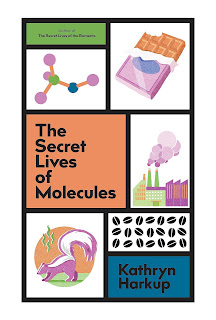Harkup builds into each article a significant story that may be tangential, but makes the subject come alive. So, for example, when talking about sodium chloride - salt - she majors on the significance of salt to humans and Ghandi's protest against the restrictive salt laws in India in the 1930s. As you go through the book you will meet other familiar, big name compounds, such as water, carbon dioxide and sulfuric acid (oddly, this, and sulfur are written as sulphur, despite sulfur now being the standard spelling both according to international chemistry bodies and the RSC). But there are also molecules that are rather more obscure by name if not by function, from lithium iron phosphate to cyanidin and geosmin (evocatively described in the article's subtitle as the smell of rain).
This is a handsome book that would clearly work well as a gift - and it is ideal for dipping into on the commute, though probably not one to read end-to-end in a sitting. It is aimed at an adult audience, but I felt occasionally that Harkup's tone drifted towards writing for younger readers. Take, for example, the final paragraph of the sodium chloride article: 'His actions, and those of his followers, did not end the salt tax, but it was the start of change. The world was now watching what went on in India. And it was clear that the British could not rule there without the consent of the Indian people.' This wording feels pitched at the level of a GCSE textbook, rather than for a more sophisticated reader.
Secret Lives certainly isn't a textbook, though. Harkup does some excellent storytelling and this makes the book an excellent addition to the surprisingly short list of good chemistry popular science titles - for some reason chemistry is definitely the Cinderella science in this regard. Although I was familiar with most of the compounds we met, in every article I learned something new. Harkup has a gift for taking a story in an unexpected direction. So, for example, in the geosmin article, she gets in the Gods of Olympus, the smells of wet earth, bacterial action, the insects called springtails and the human sense of smell. It's a book that's entertaining and informative in equal measures.
Review by Brian Clegg - See all Brian's online articles or subscribe to a weekly email free here




Comments
Post a Comment